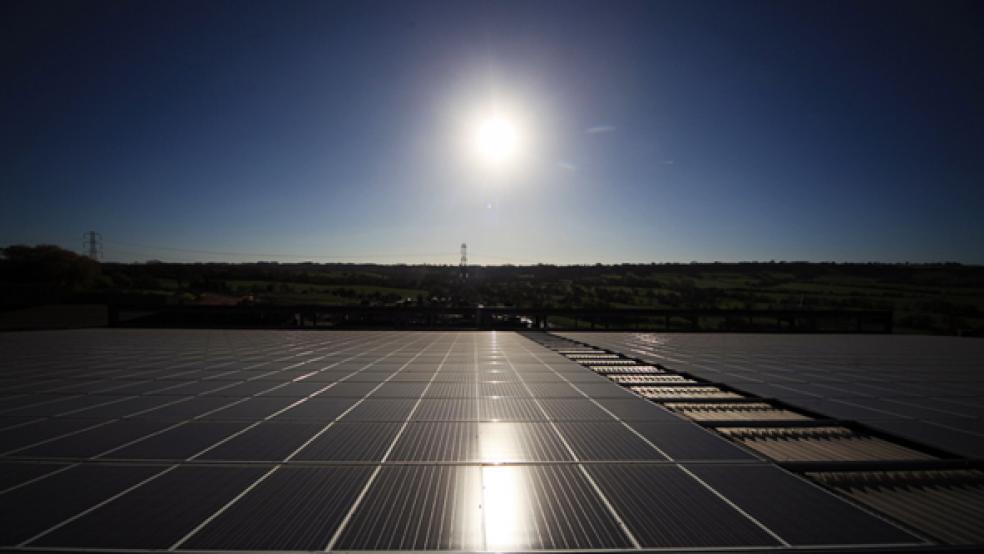While Republicans in Congress were busy attacking the Obama administration for helping domestic solar manufacturers like Solyndra, the Commerce Department was investigating whether Chinese firms, which dominate the global market, received illegal government subsidies as part of a concerted effort to dominate the U.S. market.
The case, brought last fall by seven U.S. manufacturers, didn’t just pit domestic solar manufacturers against Chinese firms and the Chinese government. The U.S. manufacturers also had to fight domestic installers, utilities and commercial consumers, who benefit from cheaper solar panels coming from abroad.
And it was the installers on Tuesday who cheered the interim ruling from the International Trade Commission (ITC) that found Chinese solar panel manufacturers were indeed illegally subsidized. But the decision said the level of subsidy was so small that the compensatory tariffs would be just 2.9 to 4.73 percent, well below the price reductions of the past year.
“This is a victory for the U.S. solar industry and its 100,000 workers,” said Jigar Shah, president of the Coalition for Affordable Solar Energy, which was organized to fight the trade case brought by domestic manufacturers. “These are relatively minor tariffs. The last thing we need when we’re getting to be a cost-effective alternative is to have the price of solar cells go up.”
RELATED: The High Cost of Clean Energy
The Coalition for American Solar Manufacturers, which represents the seven manufacturers that filed the trade complaint, is now pinning its hopes on the second part of the case, which accuses individual Chinese firms of dumping their products on the U.S. market at prices well below their cost of production. U.S. trade laws and the World Trade Organization prohibit both illegal subsidies and predatory pricing to seize market share. A ruling on CASM’s anti-dumping complaint is due in mid-May.
“Today’s announcement affirms what U.S. manufacturers have long known: Chinese manufacturers have received unfair and WTO-illegal subsidies,” said Steve Ostrenga, chief executive officer of Helios Solar Works in Milwaukee, Wis., and a spokesman for CASM. “We look forward to addressing all of China’s unfair trade practices in the solar industry.”
In 2010, the Energy Department estimated the Chinese government had provided its domestic solar manufacturing companies with more than $30 billion in subsidies as part of a centrally-planned effort to seize control of what Chinese officials believe will be one of the leading energy industries of the 21st century. Though U.S. government-funded laboratories have developed most of the technologies that go into the production of solar panels, a dozen domestic manufacturers spun off from those efforts have laid off workers, gone bankrupt or closed plants in the past two years.
The most notable example was Solyndra, which Republicans accused of receiving favorable treatment from the Obama administration with a $500 million loan guarantee. Industry observers say the company failed because commercialization of its innovative technology depended on relatively high prices for solar cells.
Shah said his installer and consumer coalition, which claims 100,000 domestic workers, would like to see a thriving domestic manufacturing sector as the solar industry continues to grow. “Manufacturing matters,” he said. “But we have to win not because we’re becoming a protectionist nation but because we’re more innovative and because we have an industrial policy.
“Look at Germany,” he continued. “They can compete in manufacturing because they train workers; they make sure their latest technologies are brought from the laboratory to the market . . . and because they have a vibrant supply chain. That doesn’t exist in the U.S.”
But some manufacturing boosters aid the final verdict still isn't in on the trade case. The anti-dumping duties could wind up being significantly higher than the minor anti-subsidy tariffs imposed Tuesday. "At this point it is far from clear what the end result of this case willb e adn how it will impact manufacturers in the U.S. and China," said Melanie Hart, a China energy and climate policy analyst at the Center for American Progress, a left-of-center think tank with close ties to the Obama administration.






